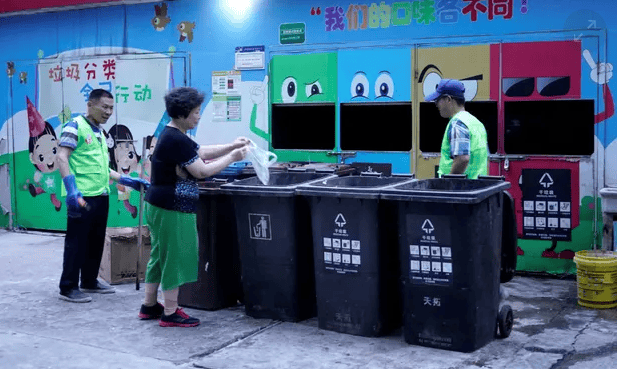Steep fines and social credit penalties face people violating complex waste sorting rules – but some say the answer is all about pigs
For the last two weeks, Shanghai residents have grappled with a singular question: “What kind of trash are you?”
The question is aimed at the city’s daily 22,000 tonnes of household waste that, according to new rules implemented on 1 July, must be sorted into one of four colour-coded bins: dry, wet, recyclable and hazardous.
While the categories may be clear, the rules are not. Chicken bones should go into the wet waste bin, but pork bones are considered dry waste. Cell phone batteries are harmful waste but older batteries go into the dry garbage. Rubbish is to be delivered to designated points at certain hours in the morning or in the evening under the supervision of volunteers.
“Every day you wake up, with one question: today what kind of trash will you be?” wrote a commentator on Sina Weibo in a widely circulated blog post titled, “The truth behind the garbage classification driving Shanghai residents crazy”.
Shanghai, home to about 23 million people, is the first in a nationwide push to raise China’s recycling rate, one of the lowest in the region at under 20%. By 2020, China hopes to bring that rate up to 35% in 46 Chinese cities and by 2025 to implement a nationwide urban waste sorting system.
The city has had since January to prepare, with hundreds of instructors holding training sessions on correct garbage sorting. Posters around the city detail what goes where, and an app provided by the city answers queries about specific items. Some 30,000 volunteers have been deployed to supervise the trash separating since the rules went into effect.
Still, residents have been so frustrated by the new rules that some have pledged to give up cooking or eating takeaway at home. At least one resident tried to ship his rubbish out of the city, according to local media. One frustrated woman throttled a volunteer trying to instruct how to sort her waste and was detained.
The public reaction is emblematic of the kind of top-down environmental policies China has been implementing for the last decade. In early June, Chinese leader Xi Jinping called trash sorting a kind of “new fashion” and urged local governments to take more decisive action.
“This is what people call authoritarian environmentalism. It’s not environmentally based consciousness from the bottom. It’s a sort of eco-dictatorship, a very strange but somehow effective mode of governance,” said Geoffrey Chun-fung Chen, a lecturer in the department of China Studies at Xi’an Jiaotong-Liverpool University in Suzhou.
The Chinese leadership has been on a mission to promote the country’s reputation for environmental sustainability, from being a leader on climate change to promoting an “ecological civilisation” at home to address the environmental impacts of the country’s rapid growth. Chen said the result was often little more than “window dressing”.
While policies such as promoting renewable power have utilised subsidies and other incentives, trash sorting has so far relied on coercion. Residents face fines of 200 yuan ($30) for individuals while companies could be fined between 50,000 to half a million yuan for violating the rules.
Within the first week of the new policy, 190 fines were doled out as well as more than 3,000 “rectification notices” to individuals and businesses.
Some residential communities are giving outbags with barcodes to scan so they can assess the participation of different households in the compound. Residents could have their social credit scores lowered and in serious cases be placed on a “public credibility platform” list.
“A lot of residents are afraid of being punished by the new policy. They have not been sufficiently incentivised that this is better for the environment,” said Chen.
Awareness of environmental issues, from air quality to soil pollution, has grown but there is little focus on cutting back on excessive waste, according to Chen. Educating the public and enforcing similar rules is likely to be harder in cities not as developed as Shanghai.
But observers believe that in the long-run the program could be effective. By piloting it in Shanghai, officials can see what works and doesn’t, Chen noted.
Residents have also come up with a rule of thumb to make categorising waste simpler. If a pig can eat it, it goes into the wet bin. If a pig cannot, it is dry waste. If a pig is likely to die from eating it, the waste is hazardous. If you could sell it and buy a pig with the funds, it is recyclable waste.
One user wrote on Weibo, laying out the unofficial guidance: “Just think about how a pig feels, and all trash can be sorted correctly.”

